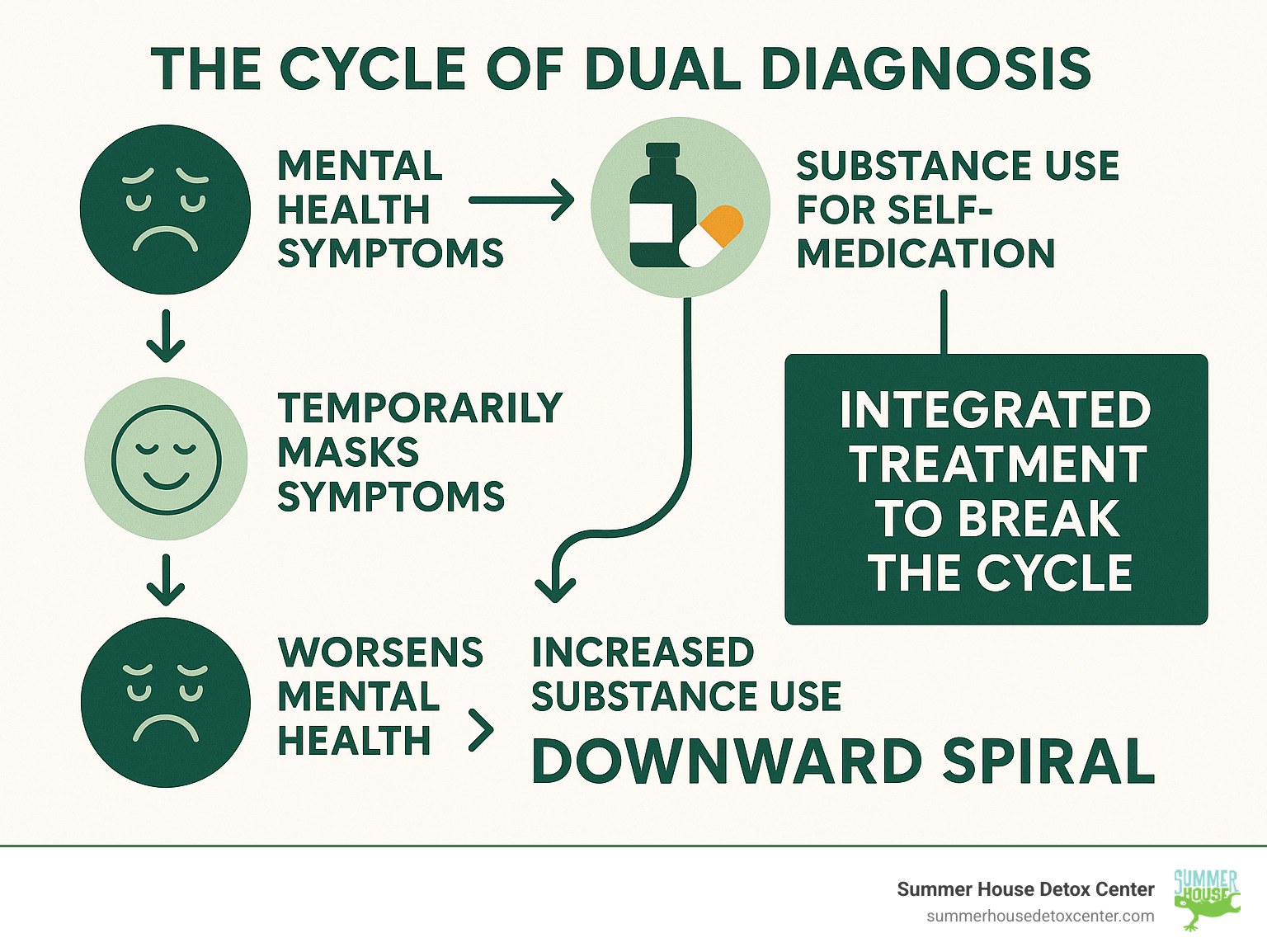Understanding the Complex Reality of Co-Occurring Disorders
Dual diagnosis detox is a specialized medical process that safely manages withdrawal symptoms while simultaneously addressing co-occurring mental health conditions in individuals with both substance use disorders and psychiatric disorders.
Key aspects of dual diagnosis detox:
- Integrated care – Treats both addiction and mental health simultaneously
- Medical supervision – 24/7 monitoring by physicians and psychiatric professionals
- Medication management – Uses appropriate medications for withdrawal and mental health symptoms
- Duration – Typically 7-10 days, though may vary based on substances and conditions
- Foundation – Prepares individuals for continued integrated treatment
When someone struggles with both addiction and mental illness, they’re caught in a dangerous cycle. About 50% of people with substance use disorders also have a mental health condition, and in 2023, approximately 20.4 million U.S. adults lived with this dual burden.
For example, someone with depression might drink alcohol to numb emotional pain. But since alcohol is a depressant, it worsens the depression, leading to more drinking and creating a downward spiral that’s hard to break.
In Florida, where substance abuse remains a concern, understanding this connection is crucial. Treating only addiction or only mental health often fails, as the symptoms of each condition can worsen the other, making recovery nearly impossible without addressing both together.
That’s where dual diagnosis detox becomes essential. Unlike standard detox programs, it recognizes that psychiatric symptoms like anxiety and depression often intensify when someone stops using substances. Without proper mental health support during this vulnerable time, people frequently relapse.

Must-know dual diagnosis detox terms:
Understanding Dual Diagnosis: Signs, Symptoms, and Challenges
A dual diagnosis means having both a mental health disorder and a substance use disorder at the same time. In Florida, we see how these conditions become intertwined, creating a complex web where one feeds the other. For instance, a person with anxiety might drink to calm their nerves, but alcohol actually increases anxiety over time. Someone dealing with trauma might use opioids to numb the pain, only to find it delays healing and worsens symptoms.
The challenge with dual diagnosis detox is that symptoms often overlap. Depression can cause fatigue similar to alcohol withdrawal, while anxiety can mimic stimulant use. This is why partial treatment is so dangerous. As the Cleveland Clinic explains, when these conditions occur together, the effects of each can worsen the other. Understanding What is Addiction? helps us recognize that recovery requires addressing the whole person.
Common Signs of a Co-Occurring Disorder
Recognizing a dual diagnosis isn’t always easy, but there are common warning signs that point to both mental health and substance use issues.

- Behavioral changes: Neglecting responsibilities, becoming secretive, extreme mood swings, and withdrawing from friends, family, and hobbies.
- Psychological symptoms: Persistent sadness or hopelessness, overwhelming anxiety, difficulty concentrating, poor judgment, or paranoia.
- Physical signs: Significant weight changes, poor personal hygiene, tremors, coordination problems, and erratic sleep patterns.
Certain combinations are very common. Depression and alcohol create a vicious cycle, as the depressant effects of alcohol worsen mood. PTSD and opioids often go hand-in-hand as a form of self-medication for trauma. The link between Anxiety and Substance Use: What’s the Connection? is also incredibly strong.
The Dangers of Treating Only One Condition
Treating just addiction or just mental health rarely works. When someone goes through detox without addressing their mental health, worsening psychiatric symptoms almost always follow. The substances they used were a harmful coping mechanism; removing them without providing healthier alternatives leads to higher relapse rates.
This creates a frustrating cycle where treating the addiction causes severe depression to pop up, or addressing the depression brings back intense cravings. The result is incomplete recovery—a person might be sober but still unable to work, maintain relationships, or find joy. This is why we believe so strongly in integrated Dual Diagnosis Rehab from day one, giving people a real chance at lasting well-being.
The Critical First Step: The Role of Dual Diagnosis Detox
When someone with co-occurring disorders takes the brave first step toward recovery in Miami, dual diagnosis detox is their lifeline. It’s not just about clearing substances from the body; it’s about creating a stable foundation where both mind and body can begin to heal together.
Medical stabilization is the cornerstone of this process. Withdrawal from substances like alcohol or benzodiazepines can be dangerous, which is why our medical team provides 24/7 supervision. We monitor vital signs and administer medications to ease discomfort and prevent serious complications like seizures.
What makes dual diagnosis detox truly different is that we understand safety during withdrawal means more than just physical safety. When someone with anxiety stops drinking, that anxiety often skyrockets. Our team anticipates these challenges and has the expertise to manage heightened psychiatric symptoms before they become overwhelming. This approach creates the foundation for recovery that makes all other therapy possible, as we explore in Why Medical Detox is a Vital First Step in Recovery.
Why a Specialized Dual Diagnosis Detox is Essential
A specialized dual diagnosis detox isn’t just helpful—it’s essential for safety and success when you’re dealing with both addiction and mental health challenges.

With integrated care from day one, our psychiatrists and therapists begin working with you immediately, addressing anxiety, depression, or trauma right alongside physical withdrawal. This requires special expertise in managing psychiatric symptoms during withdrawal. Our team knows how to steer these complex waters safely, which is central to our approach to Detox Mental Health.
This integrated model is crucial for preventing complications. Ignoring psychiatric symptoms during detox increases risks of self-harm or severe psychological distress. Our 24/7 medical and psychiatric supervision in our Miami facility ensures any emerging issues get immediate attention in a safe, controlled environment.
What to Expect During the Detox Process
Knowing what to expect during dual diagnosis detox can ease any anxiety about this crucial first step. Your journey begins with a comprehensive medical and psychiatric assessment, which becomes the blueprint for your personalized detox plan.
Common withdrawal symptoms vary by substance:
- Alcohol withdrawal can bring tremors, anxiety, and insomnia, or in severe cases, hallucinations and seizures.
- Opioid withdrawal typically includes muscle aches, restlessness, and intense cravings.
- Benzodiazepine withdrawal can be particularly dangerous, potentially causing seizures and psychosis, which is why medical supervision is critical.
Most people complete the physical detox process in 7-10 days, though the timeline can be more complex with polydrug dependence (addiction to multiple substances). Medication-Assisted Treatment (MAT) often plays a vital role in making withdrawal safer and more comfortable. We use appropriate medications to ease symptoms and reduce cravings, an approach detailed in Understanding Medication-Assisted Treatment.
Throughout your stay, you’ll receive continuous medical care in a tranquil, supportive environment. To learn more, visit our Detox Services page.
Integrated Treatment: Therapies and Approaches for Lasting Recovery
After you’ve completed dual diagnosis detox and stabilized, the real work of recovery begins. Think of detox as clearing the fog; now it’s time to learn how to steer the road ahead with confidence.
At Summer House Detox Center in Miami, we use a simultaneous treatment model, treating your mental health and addiction as equal partners. Instead of just managing symptoms, we help you address the root causes of both conditions. You’ll learn to understand the connections between them and build healthy coping skills that actually work. Recovery is about creating a life worth living, which is why aftercare planning starts early. This comprehensive approach is why we believe in Breaking the Chains of Addiction: Why Rehab is the Key.
Effective Therapeutic Modalities
One size doesn’t fit all in dual diagnosis treatment, so we offer a variety of evidence-based therapies custom to your unique needs.

- Cognitive-Behavioral Therapy (CBT) is a cornerstone of treatment. It helps you recognize and change the negative thought patterns that fuel both mental health symptoms and substance use.
- Dialectical Behavior Therapy (DBT) is particularly helpful for managing intense emotions. It focuses on four key skills: mindfulness, distress tolerance, emotion regulation, and interpersonal effectiveness.
- Individual therapy provides a safe, one-on-one space to explore your personal history, trauma, and the unique challenges that led to your dual diagnosis.
- Group therapy offers the powerful realization that you’re not alone. It’s a safe place to practice new skills and build a community with others on a similar journey.
- Holistic approaches like yoga, meditation, and nutritional counseling are also integrated to support comprehensive healing.
As we explore in The Role of Therapy in Detox, therapeutic intervention is a key part of the process from the very beginning.
Building a Strong Support System for Sobriety
Recovery is a team sport. The most successful recoveries happen when people build strong, supportive networks.
- Family involvement is crucial. We offer family counseling and education to help your loved ones understand dual diagnosis and learn how to support your recovery. Groups like Al-Anon or Nar-Anon can also be incredibly beneficial.
- Peer support provides a powerful connection with others who’ve walked in your shoes. Many of our clients in Florida find great value in 12-Step programs like Alcoholics Anonymous or Narcotics Anonymous, which are widely available in the Miami area.
- Long-term recovery prospects are very encouraging when proper integrated treatment is received. We focus on relapse prevention strategies, helping you identify personal triggers and develop a detailed action plan for challenging situations. Your support network becomes your safety net, helping you steer potential pitfalls and celebrate your successes.
Frequently Asked Questions about Dual Diagnosis Detox in Florida
When you’re considering dual diagnosis detox treatment in Florida, it’s natural to have questions. Here are answers to some of the most common ones we hear at our Miami facility.
How do I know if I need a dual diagnosis program?
You might benefit from a dual diagnosis detox program if you:
- Have a history of mental illness like depression, anxiety, or PTSD alongside your substance use.
- Find yourself using substances to cope with difficult emotions or to self-medicate.
- Have tried to get sober before, only to find your mental health symptoms became unbearable.
- Are experiencing symptoms of both a substance use disorder and a mental health condition at the same time.
The best way to know for sure is through a professional psychiatric assessment, which our team in Miami can provide.
What makes a dual diagnosis detox program different from a standard one?
While both focus on safe detoxification, a dual diagnosis detox program is more comprehensive. The key differences are:
- Simultaneous Treatment: Your substance use and mental health are addressed together from day one, not one after the other.
- On-site Psychiatric Staff: You have access to psychiatrists and mental health professionals who specialize in co-occurring disorders.
- Therapy Integration During Detox: Counseling begins as soon as you are medically stable, providing you with tools and support right away.
- Specialized Symptom Management: The team is trained to handle the complex interaction between withdrawal symptoms and psychiatric symptoms safely and effectively.
How do I find a reputable dual diagnosis treatment center in Florida?
Finding the right treatment center is crucial. Here in Florida, look for these key indicators of quality care:
- State Licensing and Accreditation: Ensure the facility is licensed by the state of Florida and accredited by a national organization like The Joint Commission or CARF. Our Miami facility is proud to hold both.
- A Multidisciplinary Team: The center should employ medical doctors, psychiatrists, licensed therapists, and registered nurses who work together on your care.
- Evidence-Based Therapies: Reputable centers use scientifically proven approaches like Cognitive Behavioral Therapy (CBT) and Dialectical Behavior Therapy (DBT).
- Individualized Treatment Plans: A quality program will create a personalized plan for your specific needs, avoiding a one-size-fits-all approach.
- Strong Aftercare Planning: Recovery is a long-term journey. A good center will help you plan for what comes next, connecting you with outpatient programs and support groups.
Your Path to Integrated Recovery Starts Here
We understand that facing a dual diagnosis can feel overwhelming, but you are not alone, and recovery is absolutely achievable. The encouraging truth is that integrated treatment is the key to a healthier, more fulfilling life. When both your mental health and substance use disorders are treated together, your chances of lasting recovery improve dramatically.
Your journey toward healing begins with a medically supervised dual diagnosis detox. This is about creating a safe foundation while simultaneously addressing the complex relationship between your mental health and addiction—healing the whole person, not just treating symptoms.
Here in Miami, Florida, we’ve seen how the right approach can transform lives. At Summer House Detox Center, we provide a peaceful, comfortable environment with 24/7 medical supervision and a multidisciplinary team who genuinely care. Our personalized care plans address your specific needs, whether you’re dealing with depression and alcohol use, anxiety and prescription drugs, or any other combination of challenges.
Many of our experienced staff have walked this path themselves. They understand the fear and hope that come with taking this first step. Seeking help isn’t a sign of weakness—it’s a sign of strength.
If you or a loved one in Florida is struggling, we encourage you to reach out. Learn more about our detox facilities in Florida and find how our integrated approach can guide you toward the brighter, healthier future you deserve.
